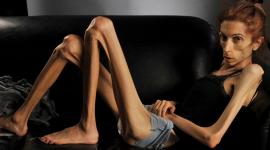Triumphant Journey - Introduction
Introduction
Topics Include:
- kinds of overeaters
- benefits of moderate eating
- dilemmas for the overeater
- personal tools needed
- how secrets relate to overeating
- affirmations
Special Exercises to:
- stop overeating
- increase inner strength
- discover secrets
- develop self respect
Introduction 1 - Idea for Triumphant Journey Begins
 In 1991, I was cohosting a radio talk show concerning health issues with Tamiko in Beverly Hills, California. She asked me to write a brief "Ten Tips to Stop Overeating" that we could offer our listeners. Her idea was a card that people could tack on a refrigerator door.
In 1991, I was cohosting a radio talk show concerning health issues with Tamiko in Beverly Hills, California. She asked me to write a brief "Ten Tips to Stop Overeating" that we could offer our listeners. Her idea was a card that people could tack on a refrigerator door.
I liked the idea of writing something simply and clearly that would help people understand how to stop overeating. But the subject is too complex for me to boil down to a card on a refrigerator door. I wish I could.
A refrigerator and snack cupboard card that might help would simply say, "Look in the exercise section of Triumphant Journey before you reach for non-essential food. You might find a better way to resolve your feelings and clear up your thinking than eating right now."
I thought of my own eating disorder history, of bingeing and throwing up for may years in secret, long before bulimia had a name. I remembered all the useless, self-deceiving and sometimes dangerous devices I used in my attempts to stop. I remembered my guilt, my growing sense of failure and despair, my loneliness and my stalwart attempts to look good. And finally, I remember accepting that my behavior would kill me. I lived believing that I would die in six months. I had no visions of any future for me and so never made long range plans that involved years of commitment.
Today, I know that bulimia was my greatest teacher. Moving through the despair of my eating disorder into a life of health, freedom and continual opportunity was and continues to be my Triumphant Journey.
I wanted to share the essence of the healing journey with my patients and especially to the people still trapped in lonely despairing eating disorders that can erode a soul.
The seeds of this book first sprouted in an article called, "Ten Tips to Stop Overeating," published by Resource Publications in Winter, 1991. In the Spring of 1992, Resources published my follow-up article, "Triumphant Journey: Understanding the Secrets of Overeating and Binge Behavior."
The many letters of appreciation I received from people struggling alone with their overeating moved and inspired me. I tried again to describe what I find to be the most helpful guidelines in addressing tenacious overeating. This book and this site at HealthPlace.com is growing out of those articles.
Overview
Part One: This section gives you some background about Joanna Poppink and explains why most diet programs don't work.
Part Two: Part Two helps you discover if you are an overeater and explores some rewards of being free from an eating disorder.
It describes what powerful emotional and life challenges must be confronted as your eating patterns become appropriate to your health and well being.
It describes personal qualities in your Essential Equipment List that are necessary in your journey to be free of overeating.
Part Three: Designed to help you stop overeating. By following this guide you can improve your relationship with food and yourself. You can begin to address the source of your need to overeat and develop more satisfying and useful ways of thinking and behaving. Part Three prepares you for doing the deep work described in Part Seven.
Part Four: Provides specific information about underlying issues in eating disorders.
It discusses how secrets relate to overeating, how those secrets can cause pain in your life today and how those secrets may have developed.
Part Five: Describes and discusses a childhood incident which helps clarify how secrets can help create and maintain eating disorders.
Part Six: By means of 20 questions, helps you discover if you have secrets in your life which may govern your overeating.
Part Seven: Describes the heart of your program to be free of your eating disorder. Here you will find preparatory exercises and an Action Plan. These will take you through the deep work of discovering secrets that can compel you to overeat. It shows you how to create and use a personal support and workbook system that will guide you through your personal recovery work.
Part Eight: Shows you how to use affirmations and gives you a list of 134 affirmations to choose from in your personal work.
Part Nine: Suggests additional sources of help for people with eating disorders.
Tragedy in Overeating: Answers that Don't Work
The addictive nature of overeating, the anguish, the memory blanks, the inability to stop, the constant search for new diets, the emotional highs of losing weight and the guilt and shame of gaining it back seems to be consistent and rampant in our culture.
I found myself frustrated that many people looked for an answer in diet and exercise programs. I got angry that desperate frightened people were being promised answers via diets and exercise programs.
Reasonable diet and exercise programs, if followed consistently, help provide a person with health and strength. But when programs completely bypass such underlying issues of eating disorders, the programs are doomed to fail.
The tragedy is that often the person doesn't know it was the program that failed. The person with the eating disorder, already racked with guilt and self-punishing thoughts, is certain that he or she was the failure. This only perpetuates despair.
It's more apparent than ever that overeating and other related behaviors (starving, compulsive exercise to work off calories, purging through laxatives or vomiting, bizarre eating rituals) are attempts to soothe emotional pain.
Most current research acknowledges that underlying causes of overeating are complex and profound. Yet people still search for and are being offered diets as answers.
Personal Rewards in Freedom From Food Tyranny
Your journey to freedom from overeating is not easy. Looking at the rewards you will reap can help sustain you when the going gets tough. As your emotional dependency on food diminishes, you will discover these changes in your life.
- You improve relationships.
- You are more sensitive and attentive to yourself and others.
- You enjoy others more and they enjoy you.
- You become physically more attractive.
- For example:
- Swollen glands shrink.
- Glazed eyes become clear and alert.
- Hair develops a healthy sheen.
- Physical movements become more coordinated and graceful.
- For example:
- You may be safer.
- You reduce or end your late night trips to grocery stores or fast food places which may put you in a vulnerable position.
- You reduce the chances of being in car accidents, from fender benders to major accidents. Such accidents can result when you, the driver, are distracted by food thoughts or by bingeing in the car.
- You have more time for people and activities when you use the energy you previously put into food and eating toward something else.
- You are more creative and productive.
- You are able to think more clearly.
- You have more energy for projects you may have considered unreachable dreams.
- You save money. You spend less on food.
- Emotionally you have more experiences of self confidence, peace and joy.
- You feel more alive.
next: Part Two: Are You An Overeater? A Check List
~ all triumphant journey articles
~ eating disorders library
~ all articles on eating disorders
APA Reference
Staff, H.
(2008, November 22). Triumphant Journey - Introduction, HealthyPlace. Retrieved
on 2026, March 2 from https://www.healthyplace.com/eating-disorders/articles/triumphant-journey-introduction



